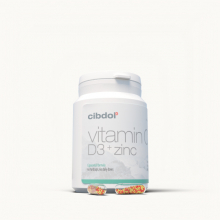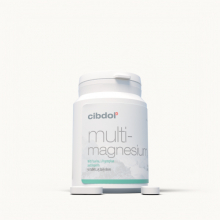Sea Moss : Nutrition, Health, and Weight Management
Published:
Discover the remarkable sea moss benefits that have been gaining popularity among health enthusiasts in recent years. This versatile red seaweed, also known as Irish moss, is a powerhouse of nutrients and potential health advantages. In this blog post, we'll investigate the nutrition profile of sea moss and how it can benefit overall health.
Contents:
- Sea Moss Nutrition
- Antioxidant Properties in Sea Moss
- Essential Vitamins Found in Sea Moss
- Minerals Present in This Versatile Algae
- Health Benefits of Sea Moss
- Weight Loss Potential with Sea Moss Fiber Content
- Risks Associated with Consuming Sea Moss
- Preparing Your Own Sea Moss at Home
- Commercial Uses for Sea Moss as a Thickener
- FAQs in Relation to Sea Moss Benefits
- Conclusion
We will explore its antioxidant properties, essential vitamins, and minerals present in this marine wonder. Additionally, we'll discuss the various health benefits of sea moss such as immune system support, digestive health improvements through increased fiber intake, skin and hair nourishment using natural ingredients.
Furthermore, you'll learn about weight loss potential with sea moss fiber content and its role in blood sugar management. We will also address risks associated with consuming sea moss including heavy metal contamination concerns related to harvesting locations and overconsumption dangers linked with excessive iodine intake.
Last but not least; find out how to prepare your own sea moss at home by soaking and cleaning raw algae along with incorporating it into smoothies or soups for a nutritious boost. Lastly, uncover commercial uses for sea moss as a thickener in various food products due to its unique gelling properties.
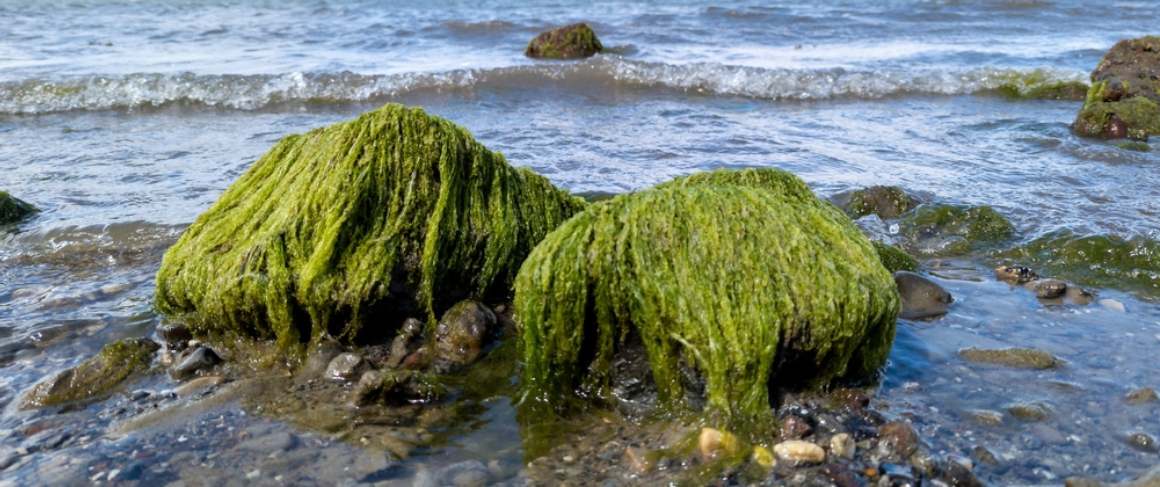
Sea Moss Nutrition
Sea moss is a nutrient-dense sea vegetable, containing antioxidants and essential vitamins and minerals. It's an excellent source of iodine, potassium, calcium, magnesium, and various B-vitamins that support overall health. In this section, we will explore the antioxidant properties in sea moss as well as the essential vitamins and minerals present in this versatile algae.
Antioxidant Properties in Sea Moss
The high antioxidant content found within sea moss helps to combat oxidative stress within our bodies by neutralizing free radicals. This process can lead to improved cellular function and reduced inflammation. By neutralizing free radicals, sea moss helps to protect against chronic diseases such as heart disease and cancer due to its high antioxidant content. [source]
Essential Vitamins Found in Sea Moss
- Vitamin B12: Known for its role in nerve function and red blood cell production; it also aids DNA synthesis which supports healthy cell growth.
- Vitamin C: A powerful antioxidant that boosts immune system function while promoting collagen production for healthier skin.
- Folate (B9): Essential for proper brain function; it plays a key role during pregnancy by helping prevent neural tube defects among other complications.
- Riboflavin (B2): Supports energy production through efficient metabolism of carbohydrates into glucose - our body's primary fuel source.
Minerals Present in This Versatile Algae
Beyond its rich vitamin content, sea moss is packed with vital minerals that contribute to overall health and wellness. Some of these minerals include:
- Iodine: Essential for thyroid function, iodine helps regulate hormones responsible for metabolism, growth, and development.
- Potassium: An electrolyte that maintains proper fluid balance within cells while also supporting muscle contractions and nerve transmissions.
- Calcium: Critical for strong bones and teeth; it also plays a role in blood clotting as well as muscle and nerve function.
- Magnesium: Involved in over 300 enzymatic reactions throughout the body - including energy production, protein synthesis, DNA replication, and more. Magnesium is crucial to maintaining optimal health levels. [source]
Incorporating sea moss into your diet can provide you with an array of essential nutrients that support various aspects of your overall health. Sea moss supplements are also available in the form of capsules or sea moss gel. Consume sea moss in moderation and consult with your healthcare provider before adding it to your diet. With its potential health benefits and nutritional content, sea moss is a valuable addition to any diet.
Sea moss is a nutrient-rich superfood that may supply vital vitamins, minerals and antioxidants to promote general well-being. By harnessing the power of sea moss, one may be able to reap numerous benefits for their immune system, digestive health and skin/hair appearance. Moving on from nutrition facts, let us now explore some potential health benefits associated with consuming this amazing algae.
Health Benefits of Sea Moss
Although many benefits are anecdotal and lack solid scientific evidence, sea moss has been associated with supporting the immune system, improving digestion, promoting healthy skin and hair growth, as well as providing thyroid support due to its high iodine content. Let's explore some of these potential health benefits in more detail.
Immune System Support from Sea Moss Consumption
Sea moss is rich in antioxidants that help protect cells from damage caused by free radicals. Antioxidants from sea moss can reduce inflammation and combat oxidative stress-related diseases, thus potentially boosting the immune system. A study published in the Journal of Food Science suggests that seaweeds like sea moss have potent antioxidant properties which can be beneficial for overall health.

Digestive Health Improvements through Increased Fiber Intake
The fiber content found in sea moss can improve digestive health by promoting regular bowel movements and preventing constipation. Moreover, it acts as a prebiotic, feeding the good bacteria present in your gut which aids digestion and supports a healthy gut microbiome. According to a research article, dietary fibers derived from seaweed could potentially provide various gastrointestinal benefits such as reduced bloating or gas production.
Skin and Hair Health Promotion Using Natural Ingredients
- Skin: The vitamins (especially vitamin E) and minerals present in sea moss play an essential role in maintaining healthy skin by nourishing it at the cellular level while also protecting against environmental damage. The anti-inflammatory properties of sea moss could be beneficial in calming skin issues like eczema or psoriasis. A study published in the Marine Drugs journal suggests that seaweed extracts have potential skin-protective effects against UV radiation and other environmental stressors.
- Hair: Sea moss is rich in essential nutrients like iron, zinc, and selenium which are vital for hair growth and strength. Applying sea moss gel directly to your scalp may help improve hair texture, reduce breakage, and promote overall hair health. An article from the BioMed Research International Journal highlights the importance of trace elements such as those found in sea moss for maintaining healthy hair structure.
Thyroid Support Due to High Iodine Content
The high iodine content present in sea moss makes it an excellent natural source for supporting thyroid function. The thyroid needs iodine to produce hormones which are vital for controlling metabolism, energy output, and body heat. According to a review published by the Journal of Nutrition, adequate intake of dietary iodine is crucial for optimal thyroid function and preventing related disorders such as hypothyroidism or goiter.
Sea Moss has many health benefits that can help improve overall wellness. With its high fiber content, Sea Moss may also be beneficial for those looking to lose weight or manage their blood sugar levels.
Weight Loss Potential with Sea Moss Fiber Content
Seaweeds like sea moss are rich in dietary fiber, which may help promote weight loss by increasing feelings of fullness while also aiding blood sugar management. This makes it a potential addition to weight-loss diets for those looking for plant-based alternatives.
How Dietary Fiber Supports Weight Loss Efforts
Dietary fiber is an essential component of a healthy diet that can aid in weight loss efforts. It helps you feel fuller for longer periods, reducing the likelihood of overeating and excessive calorie consumption. Conversely, foods with higher fiber content are typically more nutrient-dense and lower in calories than those without. Studies have shown that individuals who consume higher amounts of dietary fiber typically have healthier body weights.
- Soluble fiber: Soluble fibers dissolve in water and form a gel-like substance during digestion, slowing down the absorption of nutrients such as sugars and fats into your bloodstream. This can help regulate blood sugar levels and reduce cravings caused by rapid fluctuations in glucose levels.
- Insoluble fiber: Insoluble fibers do not dissolve in water but instead add bulk to your stool, promoting regular bowel movements and preventing constipation. By improving digestive health, insoluble fibers contribute indirectly to maintaining a healthy body weight.
The Role of Seaweed Fibers on Blood Sugar Management
Beyond their high-fiber content, seaweeds like sea moss contain unique bioactive compounds called phlorotannins that may further support blood sugar management. According to research published in the journal Nutrients, phlorotannins have been shown to inhibit the activity of enzymes responsible for breaking down carbohydrates into simple sugars, thus reducing their absorption and preventing blood sugar spikes.
This dual action of high fiber content and phlorotannin presence makes sea moss a promising ingredient for those looking to improve blood sugar control while pursuing weight loss goals. By incorporating sea moss into your diet, you can potentially reap the benefits of both its dietary fiber and unique bioactive compounds in supporting your journey towards a healthier body weight.
Overall, Sea Moss provides a unique and powerful source of dietary fiber that can be beneficial to weight loss efforts. Still, prior to adding this algae to one's diet, it is critical to take into account the possible hazards that may come with consuming sea moss.
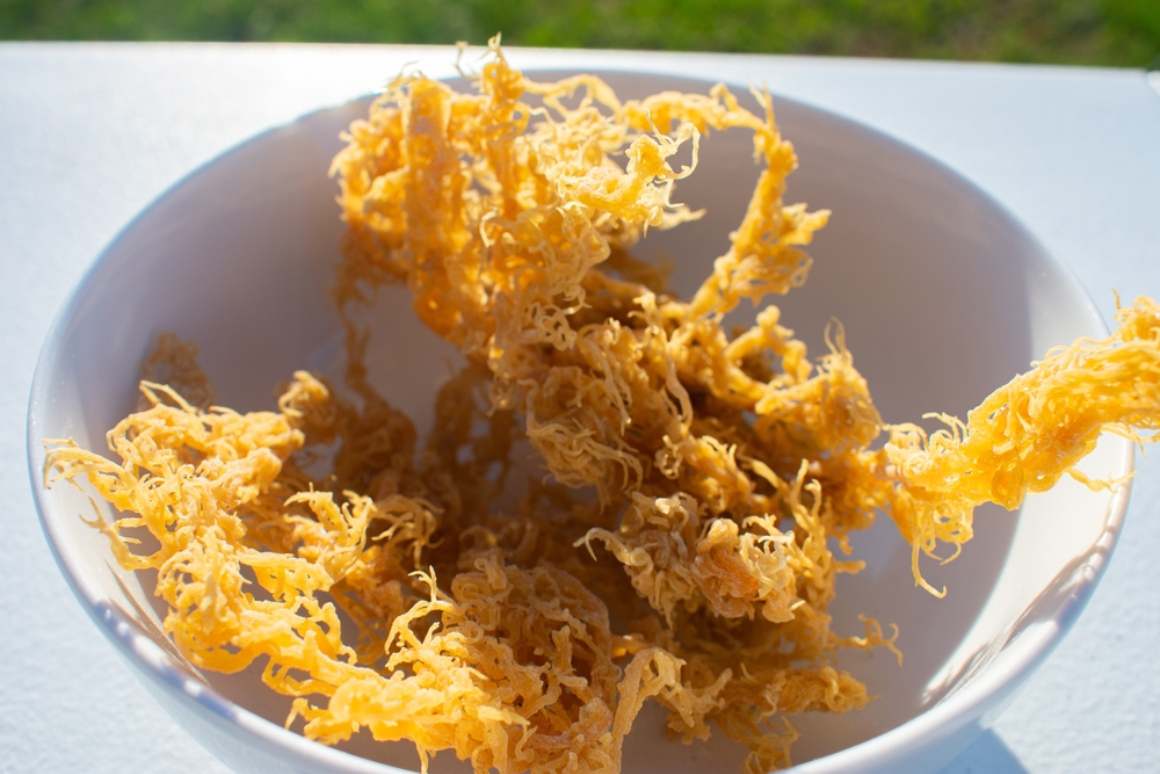
Risks Associated with Consuming Sea Moss
While there are numerous benefits attributed to consuming sea moss regularly, it's important to be aware of possible risks such as heavy metal contamination or overconsumption of iodine. Moderation is key when incorporating this superfood into your diet.
Heavy Metal Contamination Concerns Related to Harvesting Locations
Sea moss grows in coastal waters, which can sometimes be polluted by industrial waste and other contaminants. As a result, the algae may absorb heavy metals, such as lead, mercury, and cadmium from its surroundings. These toxic substances can accumulate in our bodies if consumed consistently over time and potentially cause health issues like kidney damage or neurological disorders.
- Choose wisely: To minimize the risk of heavy metal exposure, purchase sea moss from reputable suppliers who harvest their products from clean waters.
- Clean thoroughly: Ensure you properly rinse and soak your raw sea moss before consumption to remove any potential impurities on its surface.
Overconsumption Dangers Linked with Excessive Iodine Intake
Iodine is an essential mineral that supports thyroid function; however, excessive intake can lead to imbalances within the body. Overconsumption of iodine-rich foods like sea moss could contribute to conditions such as hyperthyroidism or hypothyroidism. It's crucial for individuals with pre-existing thyroid issues or those sensitive to iodine levels to consult their healthcare provider before adding significant amounts of sea moss into their diets.
- Moderate consumption: Enjoy the benefits of sea moss by incorporating it into your diet in moderation. A small daily serving or a few times per week should suffice for most individuals.
- Monitor iodine intake: Be mindful of other sources of dietary iodine, such as seafood, dairy products, and iodized salt to ensure you're not exceeding the recommended daily allowance (RDA).
Incorporating sea moss into your lifestyle can offer numerous health benefits; however, being aware of potential risks and taking necessary precautions will help you enjoy this nutrient-dense superfood safely. Remember that moderation is key when adding any new food item to your diet.
Be mindful of the potential hazards when consuming sea moss and make sure to buy from a reliable vendor. Preparing your own sea moss at home can help you avoid any potential contamination issues while allowing for more creative recipes incorporating this superfood into your diet.
Preparing Your Own Sea Moss at Home
Sea moss can be easily prepared and incorporated into your diet, allowing you to control the quality and quantity of this nutritious superfood. By following a few simple steps, you can create your own batch of raw or dried sea moss that is ready for consumption.
How to Soak and Clean Raw Sea Moss
- Gather the necessary materials: You will need raw sea moss (available online or in health food stores), a large bowl, clean water, and a strainer.
- Rinse the sea moss: Place the raw sea moss in a strainer under running water to remove any debris or salt particles. Be sure to rinse it thoroughly.
- Soak overnight: Transfer the rinsed sea moss into a large bowl filled with enough clean water so that it's fully submerged. Allow it to sit in the water for a minimum of 8 hours. The soaking process helps soften its texture while also removing any remaining impurities.
- Rinse again after soaking: After soaking, drain off the excess water using a strainer before giving it another thorough rinse under running tap water. This ensures all unwanted residues are removed from your soaked sea moss.
Incorporating Sea Moss into Smoothies, Soups, or Other Recipes
The versatility of soaked sea moss makes it easy to incorporate into various recipes requiring natural thickening agents without altering their taste significantly. Here are some ideas on how you can add this nutrient-rich algae into different dishes:
- Smoothies: Blend soaked sea moss with your favorite fruits, vegetables, and liquids to create a nutrient-packed smoothie that provides an extra boost of vitamins and minerals.
- Soups: Add small amounts of soaked sea moss directly into soups or stews during the cooking process. It will act as a natural thickener while also providing additional nutrients.
- Desserts: Incorporate soaked sea moss into puddings, custards, or other desserts requiring thickeners for added nutritional benefits without compromising their taste or texture.
Incorporating sea moss into your diet can be simple and enjoyable. By preparing it at home and adding it to various recipes, you can take advantage of its numerous health benefits while controlling the quality and quantity consumed. Sea moss supplements are also available for those who prefer a more convenient option.
Creating your own sea moss can be an uncomplicated and economical way to include this nutrient-rich algae in your diet. Moving on, let's explore the commercial uses of sea moss as a thickener in food products.
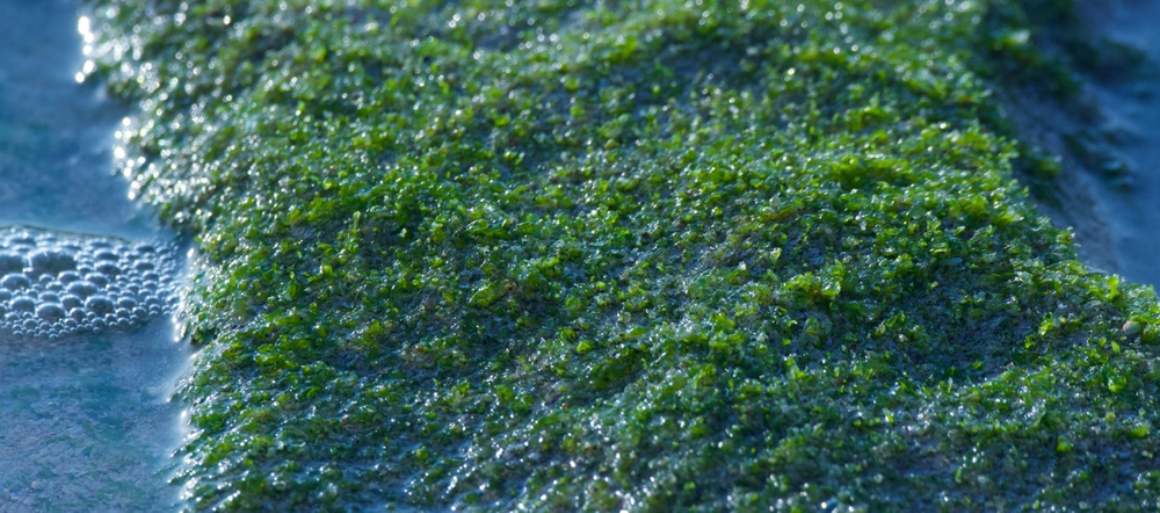
Commercial Uses for Sea Moss as a Thickener
Sea moss is not only known for its nutritional benefits but also its unique gelling properties, making it an ideal food-thickening agent in various commercial products. Sea moss can be used as a vegan-friendly and plant-based alternative to conventional thickeners such as gelatin or cornstarch, due to its natural gelling properties.
The Science Behind the Gelling Properties of Sea Moss
Sea moss contains a soluble fiber called carrageenan, which has the ability to form gels when combined with water. Carrageenan molecules bind together and create a network that traps water, resulting in the formation of a gel-like substance. The thickening power of sea moss makes it an attractive ingredient for use in various commercial applications where texture and consistency are important factors.
Examples of Commercial Foods Using This Algae
- Dairy-free yogurts: Many dairy-free yogurt brands use sea moss as a thickener to achieve their desired creamy texture without relying on animal-derived ingredients such as gelatin or milk proteins. For example, some coconut-based yogurts incorporate this algae into their recipes.
- Vegan cheese alternatives: Sea moss can help replicate the smoothness and firmness found in traditional cheeses while keeping them completely plant-based. Some artisanal vegan cheese producers have started using this seaweed due to its excellent binding properties.
- Nutrient-dense beverages: Smoothie companies may add sea moss to their drinks not only because of its potential health benefits but also because it helps create a thicker, more satisfying texture. This is especially useful in meal replacement shakes where consumers are looking for a filling and nutritious option.
- Desserts: Sea moss can be used to thicken puddings, mousses, and other desserts without altering their flavor profile. Its neutral taste allows it to blend seamlessly with various ingredients while providing the desired consistency.
Incorporating sea moss into commercial food products not only offers an alternative thickening agent but also provides additional nutritional benefits due to its rich vitamin and mineral content. As consumer interest in plant-based products increases, it is likely that sea moss will be used more creatively in the future.
FAQs in Relation to Sea Moss Benefits
Are there proven benefits of sea moss?
Yes, sea moss has several proven health benefits. It is rich in essential vitamins, minerals, and antioxidants that support the immune system, improve digestion, promote skin and hair health, and aid weight loss efforts. However, more research is needed to fully understand its potential therapeutic effects. For more information on sea moss benefits, visit Healthline.
What happens if you take sea moss everyday?
Consuming moderate amounts of sea moss daily can provide nutritional benefits such as improved digestion and immune support. However, excessive intake may lead to side effects like iodine toxicity or heavy metal contamination depending on the harvesting location. It's important to follow recommended dosages and consult a healthcare professional before incorporating it into your daily routine.
Is sea moss scientifically proven?
Some scientific studies have shown promising results regarding the nutritional content and health benefits of sea moss; however, further research is required to establish definitive evidence for its efficacy in treating specific conditions or providing long-term health improvements. To learn more about current research findings related to seaweed nutrition in general, visit PubMed.
Conclusion
It contains antioxidants, essential vitamins, and minerals that support the immune system, digestive health, skin and hair health, and weight loss efforts. However, caution should be exercised when consuming sea moss due to potential heavy metal contamination and overconsumption of iodine.
If you'd like to take advantage of the many sea moss benefits, there are various ways to use it in your diet or skincare routine, such as preparing it at home or finding commercial products that include it. Overall, sea moss benefits make this versatile algae worth considering for those looking to boost their overall well-being.









